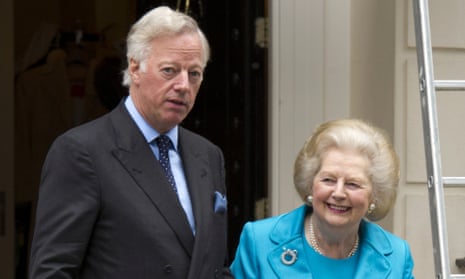Margaret Thatcher’s son Mark was in effect forbidden to live in Britain after being repeatedly warned that he was damaging his mother’s reputation, according to her new biography.
Senior Whitehall mandarins believed Sir Mark Thatcher’s business dealings were “driven by greed” and his mother’s attitude towards them “conveyed a whiff of corruption”.
The former Conservative prime minister even asked her principal private secretary Sir Clive Whitmore to tell Mark that he had to stop “trying to exploit his mother’s name” in his Middle East oil deals, but he refused. Whitmore said: “Mark was driven by greed and reluctant to pass up any opportunity.”
Robin Butler, who also served as Lady Thatcher’s principal private secretary when the Observer broke a story in 1984 about Mark and his mother’s involvement in a Cementation construction deal in Oman, was more severe.
Other bidders for the contract had complained that Thatcher used her influence with the Sultan of Oman to get the contract for the firm Mark was working for.
Butler said: “He thought that Mrs Thatcher’s behaviour in Oman had conveyed a whiff of corruption, though she might not have regarded it as such. She had wanted to see Mark right. She sought the deal for Mark. She excluded everyone from her talks with the Sultan. Mark was dealing with Brigadier Landon, who was the Sultan’s go-between. She behaved in the most peculiar way. I suspected the worse.”
After the Cementation story appeared, it was decided by Denis Thatcher that it would be best for all concerned if Mark were to leave the country. Thatcher had “an air of resignation about it all, but was indulgent to Mark”, Whitmore said. “The rational prime minister knew well what he was up to, but the mother found it difficult to be tough with him.”
